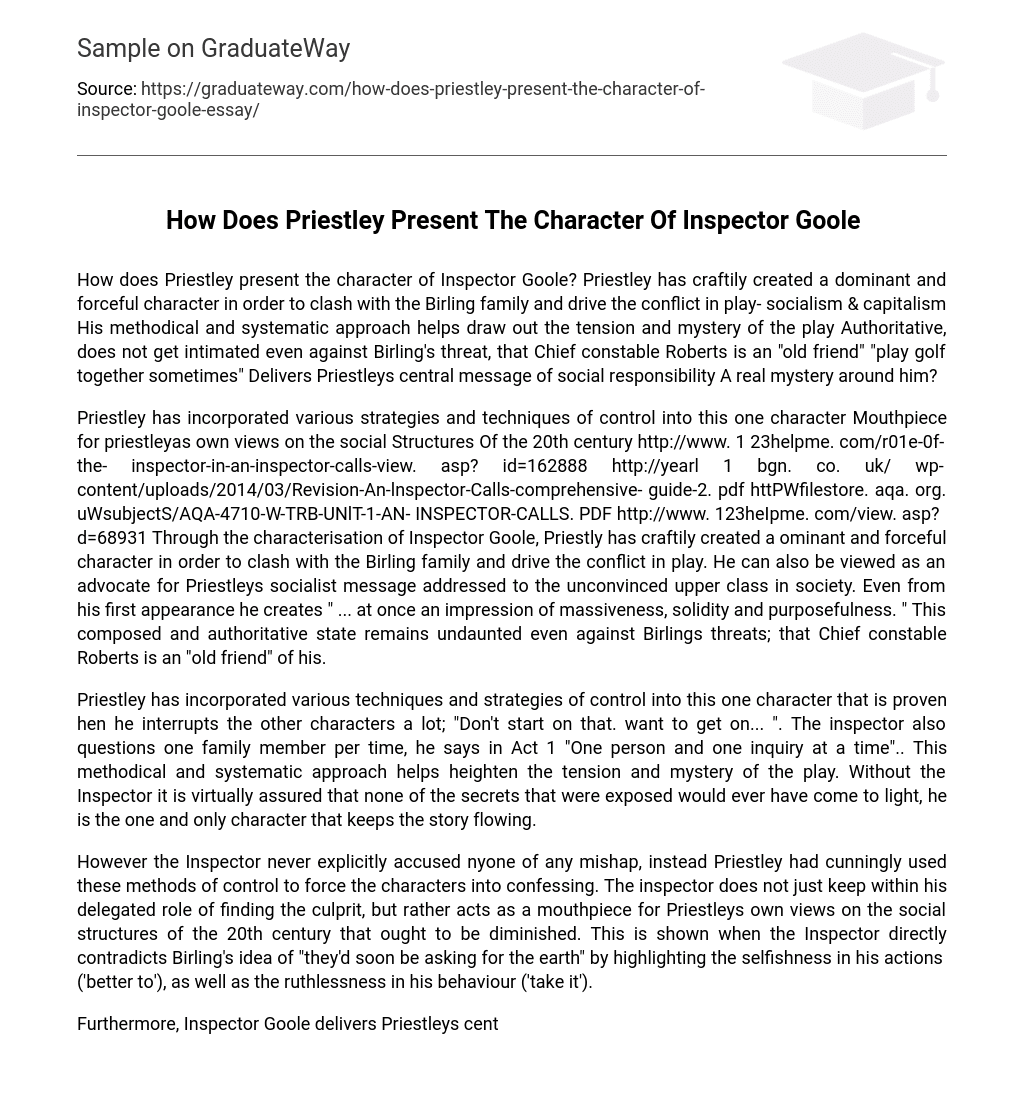How does Priestley present the character of Inspector Goole? Priestley has craftily created a dominant and forceful character in order to clash with the Birling family and drive the conflict in play- socialism & capitalism His methodical and systematic approach helps draw out the tension and mystery of the play Authoritative, does not get intimated even against Birling’s threat, that Chief constable Roberts is an “old friend” “play golf together sometimes” Delivers Priestleys central message of social responsibility A real mystery around him?
Priestley has incorporated various strategies and techniques of control into this one character Mouthpiece for priestleyas own views on the social Structures Of the 20th century http://www. 1 23helpme. com/r01e-0f-the- inspector-in-an-inspector-calls-view. asp? id=162888 http://yearl 1 bgn. co. uk/ wp-content/uploads/2014/03/Revision-An-lnspector-Calls-comprehensive- guide-2. pdf httPWfilestore. aqa. org. uWsubjectS/AQA-4710-W-TRB-UNlT-1-AN- INSPECTOR-CALLS. PDF http://www. 123heIpme. com/view. asp? d=68931 Through the characterisation of Inspector Goole, Priestly has craftily created a ominant and forceful character in order to clash with the Birling family and drive the conflict in play. He can also be viewed as an advocate for Priestleys socialist message addressed to the unconvinced upper class in society. Even from his first appearance he creates ” … at once an impression of massiveness, solidity and purposefulness. ” This composed and authoritative state remains undaunted even against Birlings threats; that Chief constable Roberts is an “old friend” of his.
Priestley has incorporated various techniques and strategies of control into this one character that is proven hen he interrupts the other characters a lot; “Don’t start on that. want to get on… “. The inspector also questions one family member per time, he says in Act 1 “One person and one inquiry at a time”.. This methodical and systematic approach helps heighten the tension and mystery of the play. Without the Inspector it is virtually assured that none of the secrets that were exposed would ever have come to light, he is the one and only character that keeps the story flowing.
However the Inspector never explicitly accused nyone of any mishap, instead Priestley had cunningly used these methods of control to force the characters into confessing. The inspector does not just keep within his delegated role of finding the culprit, but rather acts as a mouthpiece for Priestleys own views on the social structures of the 20th century that ought to be diminished. This is shown when the Inspector directly contradicts Birling’s idea of “they’d soon be asking for the earth” by highlighting the selfishness in his actions (‘better to’), as well as the ruthlessness in his behaviour (‘take it’).
Furthermore, Inspector Goole delivers Priestleys central message of social responsibility by several means. On the basis of symbolism the Inspector can be seen as a superficial character than a human, perhaps suggested within his own name which is a homophone to ‘ghoul’. By doing so Priestley is somewhat foreshadowing the future events and highlighting the fact that it is the family’s own responsibility to right their wrongs, rather than the Inspector’s (Priestlys message ?C]sociaI responsibility). Another example would be when the inspector states, “If there’s nothing else, e’ll have to share our guilt. : Priestly, through the Inspector, talks of ‘sharing to emphasise how important sharing is within a society (link to his socialist ideas). Here the Inspector is highlighting that the only thing the Birlings will share is their guilt (due to their selfish nature), which will be so large (due to their actions) that the only way to cope with it will be to take collective responsibility. Older vs younger generation : “we often do on the young ones. Theyre more impressionable” Highlighting the generation gap
The older generation’s views represent those of the time the play was set. outdated The younger generation’s represent the views Priestly and many others felt Britain should hold after the two wars, in order to move the country forward. ‘impressionabl‚ stresses how important it is that we teach the new generation the right way, the importance of social responsibility. Mr and Mrs Birling spend so much of the play telling Eric and Sheila what to do, but are the children wiser as they understand the Inspector’s (and Priestlys) message.





